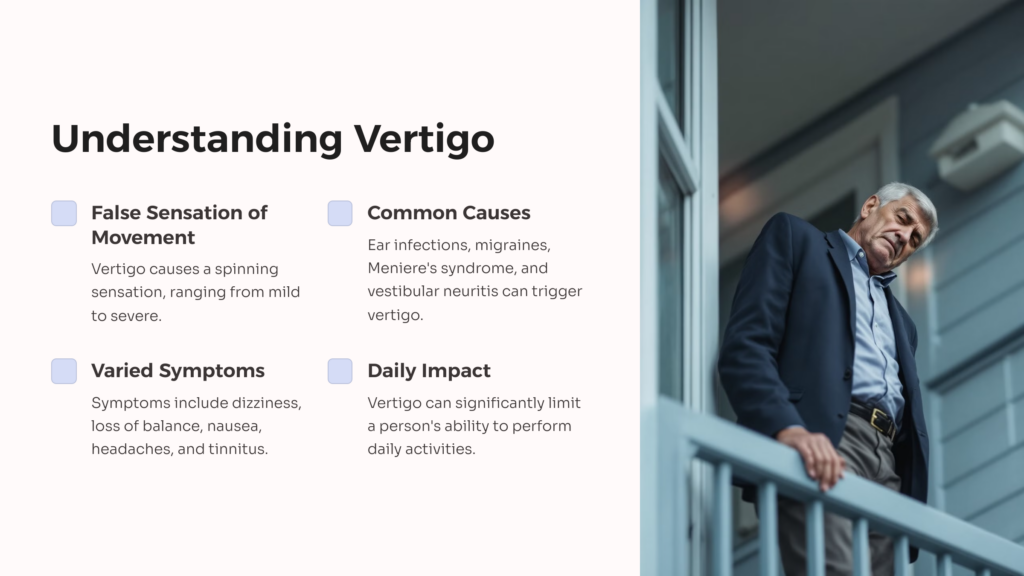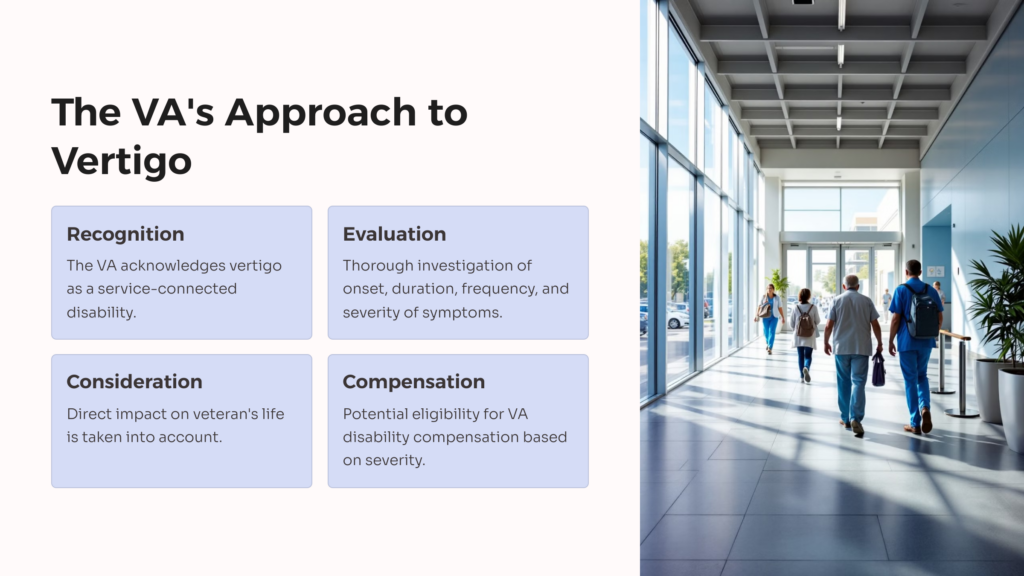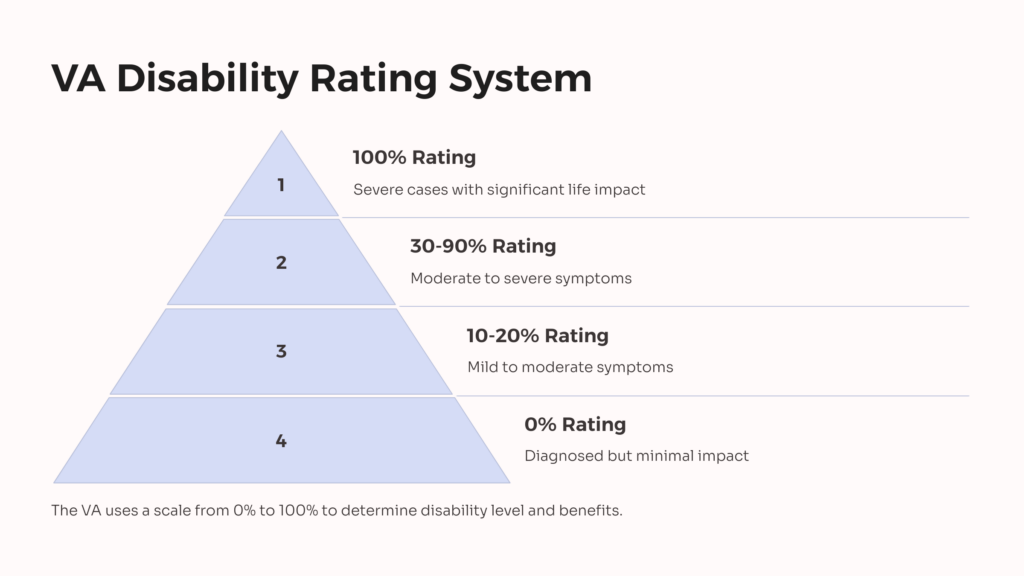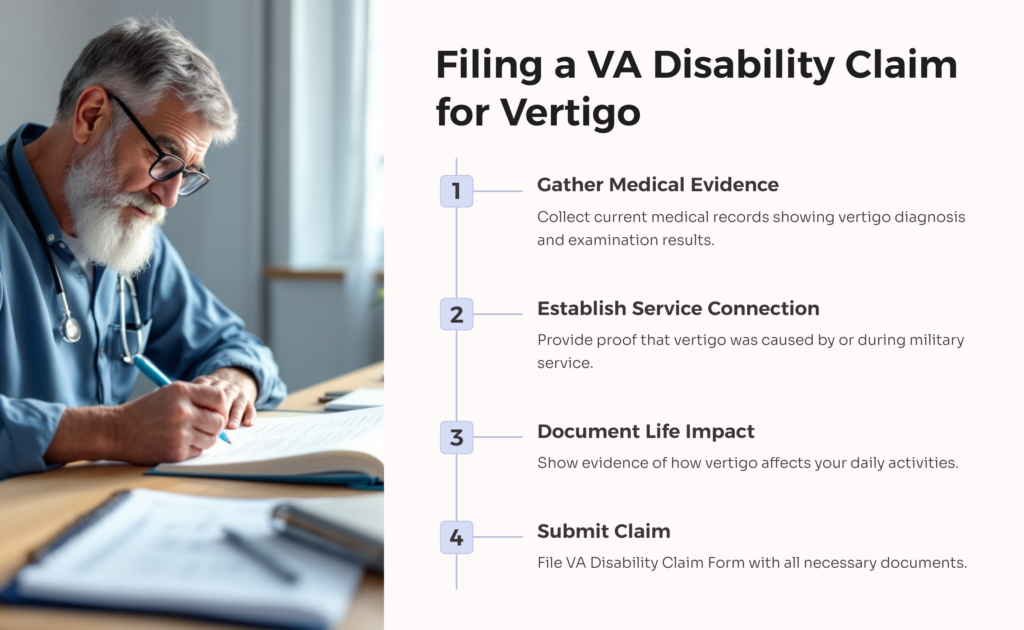Vertigo is a sensation often described as a feeling of spinning. This leads to an impaired balance that can make standing, and sometimes even sitting, extremely difficult. This can particularly affect veterans, due to various scenarios amidst military service that may lead to the development of neurological conditions such as vertigo. This article will delve into what vertigo is, the VA’s stance on vertigo, the respective VA rating system, and how one can go about filing a VA disability benefits claim with the VA for vertigo.

Vertigo is a specific type of inner ear disorder where individuals experience a false sensation of movement. While it could merely feel like a slight spinning sensation, vertigo can also manifest as a violent whirl that can lead to nausea and loss of balance. Some of the most common causes of vertigo include ear infections, migraines, Menieres syndrome, and vestibular neuritis.
Vertigo symptoms can range from mild, occasional dizziness, to severe, often including dizziness, a loss of balance, unsteadiness, nausea, headaches, and a ringing sensation in the ears. As such, vertigo can significantly affect a person’s life, limiting their ability to perform daily activities such as working, driving, or even simple tasks like walking.
Vertigo is often also experienced with hearing loss or tinnitus, as it can be caused by vestibular disequilibrium in the inner ear.
The Role of The VA

The VA recognizes vertigo as a service-connected disability, particularly when related to traumatic brain injuries, which are unfortunately common in military personnel. The VA takes the diagnosis, evaluation, and treatment of vertigo quite seriously, thoroughly investigating the onset, duration, frequency, and severity of the vertigo symptoms.
When handling a vertigo disability benefits case, the VA considers both the direct impact of the condition on the veteran’s life and their potential eligibility for VA disability compensation. The process involves careful medical evaluations, applications of the VA disability rating system, and possible VA disability compensation depending on the severity of the condition.
Understanding the VA Disability Rating System

The VA rating system is a method through which the VA determines a veteran’s level of disability. It operates on a scale from 0% to 100%, which reflects the severity of the disability, its impact on the veteran’s life, and how much VA disability benefits can be awarded.
When it comes to vertigo and other vestibular disorders, the VA uses a diagnostic code to assign the rating. Each diagnostic code reflects specific symptoms and condition characteristics, and they are instrumental in determining the final disability rating for vertigo.
How The VA Rates Vertigo
Three diagnostic codes play a pivotal role when it comes to vertigo VA benefits – 6204, 6205, and 6211. Code 6204 represents Menieres syndrome, 6205 corresponds to a vestibular disorder, and 6211 is for peripheral vestibular disorders. Each code’s rating criteria is unique and is based on the symptoms, their frequency, and the degree of hearing impairment.
The VA applies these codes to determine the severity of a veteran’s vertigo. With the diagnostic criteria in play, and a complete medical examination record upholding the symptoms, the assigned disability range can be between 10% to 100%, depending on the case’s particularities and complexity.
Filing a VA Disability Claim for Vertigo

To file a VA benefits claim for vertigo, multiple documents and pieces of medical evidence are required. Key records involve current medical evidence showing a physical examination and a vertigo diagnosis, proof of a service connection (i.e., the vertigo was caused by or during military service), and evidence that vertigo impacts the veteran’s daily life.
The process of filing the VA claim involves submitting these documents, along with a VA Disability Claim Form, to the VA, who then analyses the submission and determines the disability rating. While the process may seem daunting, abiding by best practices – such as fully understanding the process, gathering all necessary documents, and working with a Veterans Service Officer – can lead to a successful claim.
Tips On How to Get a Higher VA Rating for Vertigo
To get a higher VA Rating for vertigo, ensure that all documentation supporting your claim is strong, correct, and organized. This includes providing extensive medical records that validate the diagnosis and the connection of your condition to your military service.
Seeking medical expertise is useful in two ways – it helps manage and possibly improve your vertigo, and it provides a wealth of evidence backing your claim. Additionally, take the time to craft a detailed, organized claim. Remember that the VA is evaluating the impact of your vertigo on your life, so the more comprehensive your application, the better.
Vertigo can greatly disrupt everyday life, and when it is connected to past military service, the VA can offer crucial support through a disability claim. Understanding the VA rating system, which includes diagnostic codes and percentage ratings, is key to ensuring you have the highest chance of a successful claim.
No veteran should be left to deal with the debilitating effects of vertigo alone. With the necessary documentation, medical backing, and a well-crafted claim, they can secure the disability compensation they deserve, and receive vital help in managing their vertigo. You served your country. Now let your country serve you. Get started today at AllVeteran.com and take our free medical evidence screening.
 AllVeteran.com Advisors
AllVeteran.com Advisors
With expertise spanning local, state, and federal benefit programs, our team is dedicated to guiding individuals towards the perfect program tailored to their unique circumstances.


















